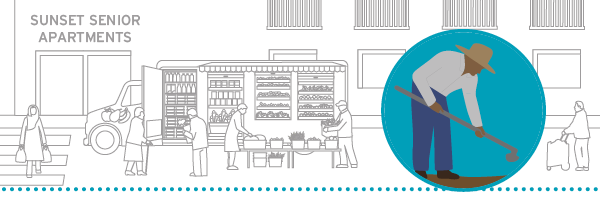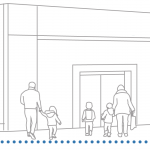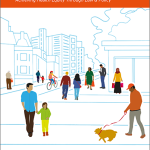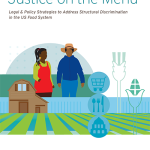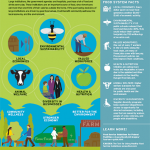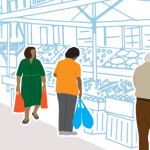Food Systems
Episode 5: Policy solutions for a values-based food system
How does the history of racial discrimination and power imbalances in our food system affect health outcomes today?
In Policy Solutions for a Values-Based Food System, our panelists discuss how the intersectionality of food systems affects the well-being of everyone in the community — from food producers to food consumers.
In the past year, COVID-19 has pushed food insecurity in the United States to unprecedented levels, particularly among BIPOC households. To move from food access toward food justice, we need a collaborative effort among community organizations, food policy councils, and local government to acknowledge structural racism in the food system and commit to transformative change. The goal of this webinar is to equip participants with action steps to operationalize the values of racial equity and a valued workforce in food system policy.
This webinar is for members of community organizations, food policy councils, anchor institutions, and local governments who want to learn new tools and practices to support a values-based and people-centered food system.
Expert Panel
- Nessia Berner Wong, senior policy analyst, ChangeLab Solutions (moderator)
- Jose Oliva, campaigns director, HEAL Food Alliance
- Karen Bassarab, senior program officer, Food Communities & Public Health, Johns Hopkins Center for a Livable Future
- Vinny Eng, community organizer and founding member, SF New Deal
- Abbey Piner, project lead, Community Food Strategies, Center for Environmental Farming Systems, North Carolina State University
- LaShauna Austria, founder, Kindred Seedlings Farm, and racial equity coach, Community Food Strategies
Highlights
History of racism: The roots of the food system today are in slavery, which set a precedent for free and cheap labor that meant food prices did not reflect their true market price or value. Post–Thirteenth Amendment, landowners sought ways to replicate that system, first through Jim Crow laws, then through the great importation of the Bracero program. Today, it shows up in the structure of our laws. ―Jose Oliva
Discrimination in the food system: An example of structural discrimination in the food system — which is a macro driver of health inequity — is in government food procurement. Driven by local, state, and federal procurement policies, it continues to leave out BIPOC-owned businesses, even with the development of BIPOC-owned business programs. ―Nessia Berner Wong
Don’t sleep on the youth. The youth organizers in our communities are working at the nexus of climate justice, land justice, racial justice, and queer justice. They’re the ones that are really delivering intergenerational education. ―Vinny Eng
Reclaiming food: When I think about my farm and what it means for land stewardship and cultivating space, I think a lot about the idea of being able to reclaim land and food for people who have been historically denied opportunity and autonomy within the food system. ―LaShauna Austria
Local policies: There are interesting policies happening at the local level. Indianapolis passed a resolution stating that racism is a public health crisis, enabling them to set up a division of community nutrition and food policy that’s now responsible for addressing racial inequity. ―Karen Bassarab
Structural discrimination: The structures in our society also tell the history of why different communities have different levels of access to key parts of agricultural infrastructure like land ownership, railroads, highways, and stores. ―Abbey Piner
Our language has to shift into abundance. White supremacy has stifled our imagination, and we can’t even imagine abundance. I’ve been working with one food council on freedom dreaming, where we ask, What do we imagine in our liberated community where there’s no lack of food or resources? ―LaShauna Austria
Youth organizers: Don’t sleep on the youth. The youth organizers in our communities are working at the nexus of climate justice, land justice, racial justice, and queer justice. They’re the ones that are really delivering intergenerational education. ―Vinny Eng
Freedom dreaming: Our language has to shift into abundance. White supremacy has stifled our imagination, and we can’t even imagine abundance. I’ve been working with one food council on freedom dreaming, where we ask, What do we imagine in our liberated community where there’s no lack of food or resources? ―LaShauna Austria
Watch a recording of episode 5:
